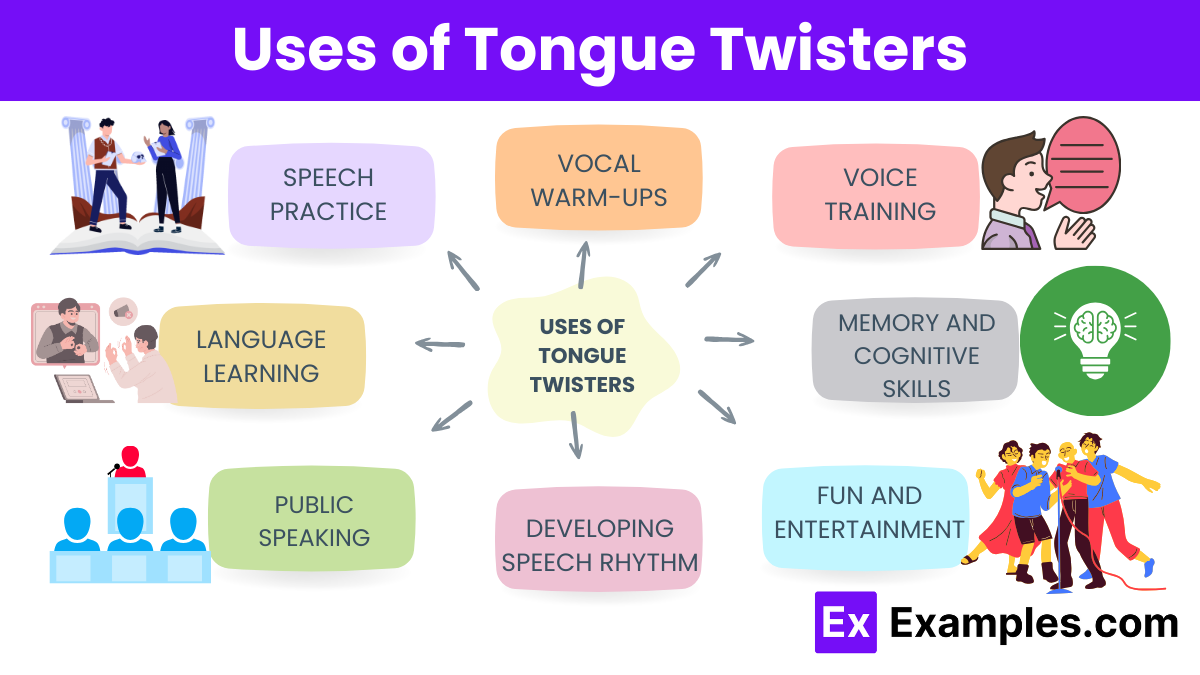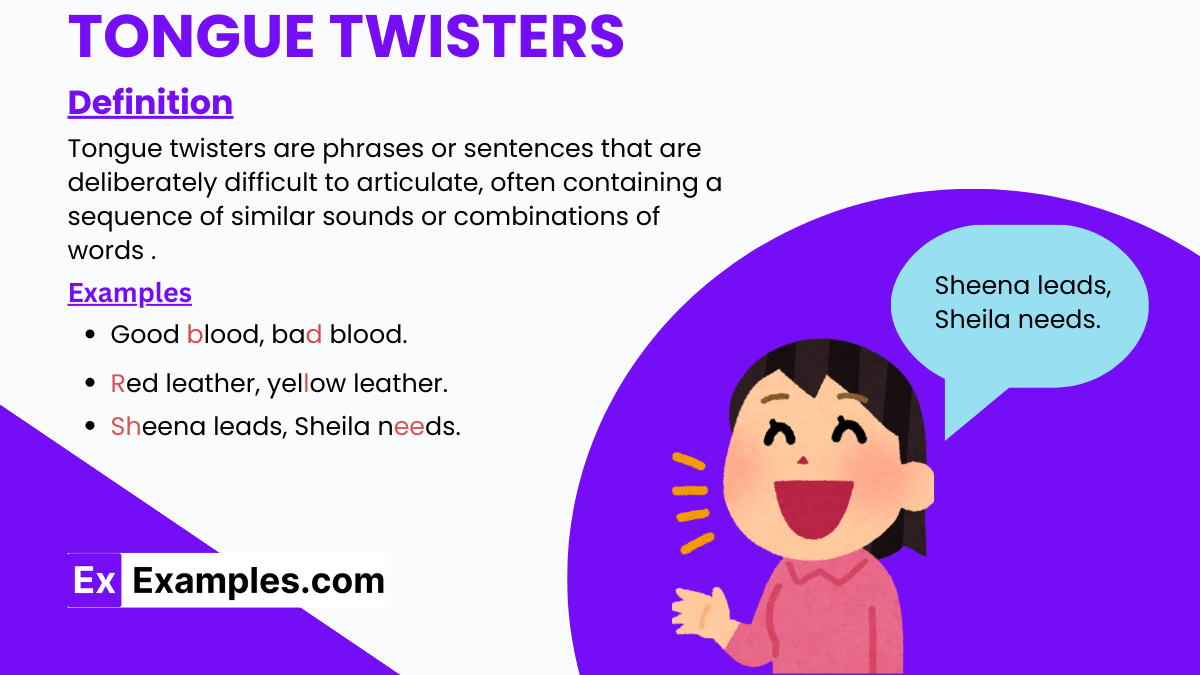75+ Tongue Twisters Examples
Tongue twisters are sequences of words or sounds that are designed to be challenging to pronounce quickly and correctly. They are often used as a spoken or linguistic game, and involve the rapid repetition of similar sounds. The primary purpose of tongue twisters is to practice and improve articulation and pronunciation, making them a useful tool in speech therapy and language learning. Additionally, tongue twisters serve as fun, engaging exercises for vocal warm-ups among actors, singers, and public speakers to improve enunciation and fluency.
What are tongue twisters?
Tongue twisters are phrases or sentences that are deliberately difficult to articulate, often containing a sequence of similar sounds or combinations of words that challenge the speaker’s pronunciation skills. These linguistic puzzles are designed to trip up the tongue, leading to humorous or entertaining results when spoken aloud. Tongue twisters are commonly used as exercises to improve pronunciation, diction, and fluency in speech, particularly in language learning or theater settings. They can range from simple phrases with repeated sounds to more complex sentences that require precise articulation and coordination of mouth movements. Despite their challenging nature, tongue twisters are also enjoyed for their playful and entertaining qualities, making them a popular form of wordplay across cultures and languages.
Popular Tongue Twisters in English
- How much wood would a woodchuck chuck if a woodchuck could chuck wood?
- She sells seashells by the seashore.
- Peter Piper picked a peck of pickled peppers.
- Betty Botter bought some butter, but she said the butter’s bitter. If I put it in my batter, it will make my batter bitter.
- Fuzzy Wuzzy was a bear. Fuzzy Wuzzy had no hair. Fuzzy Wuzzy wasn’t very fuzzy, was he?
- How can a clam cram in a clean cream can?
- Six slippery snails slid slowly seaward.
- Sally sells seashells by the seashore; The shells that she sells are surely seashells. So if she sells shells on the seashore, I’m sure she sells seashore shells.
- She saw Sherif’s shoes on the sofa. But was she so sure those were Sherif’s shoes she saw?
- Which wristwatches are Swiss wristwatches?
- I scream, you scream, we all scream for ice cream.
- Amidst the mists and coldest frosts, With stoutest wrists and loudest boasts, He thrusts his fists against the posts and still insists he sees the ghosts.
- I wish to wish the wish you wish to wish, but if you wish the wish the witch wishes, I won’t wish the wish you wish to wish.
- How many cookies could a good cook cook If a good cook could cook cookies? A good cook could cook as much cookies as a good cook who could cook cookies.
- Peter Piper picked a peck of pickled peppers; A peck of pickled peppers Peter Piper picked. If Peter Piper picked a peck of pickled peppers, Where’s the peck of pickled peppers Peter Piper picked?
Funny Tongue Twisters
- he sells seashells by the seashore.
- In this classic tongue twister, the repetition of the “s” sound makes it challenging to pronounce, especially when spoken quickly.
- Peter Piper picked a peck of pickled peppers.
- The repeated “p” sound in this tongue twister makes it a delightful challenge for the tongue.
- How can a clam cram in a clean cream can?
- The repeated “c” sound adds a comedic twist to this tongue twister, making it both challenging and entertaining.
- Fuzzy Wuzzy was a bear. Fuzzy Wuzzy had no hair. Fuzzy Wuzzy wasn’t very fuzzy, was he?
- The repetition of “Fuzzy Wuzzy” and the play on words with “fuzzy” make this tongue twister a fun and memorable exercise in pronunciation.
- Betty Botter bought some butter, but she said the butter’s bitter. If I put it in my batter, it will make my batter bitter.
- The repeated use of “b” sounds and the wordplay with “butter” and “bitter” make this tongue twister both challenging and amusing.
- Silly Sally swiftly shooed seven silly sheep.
- The repetition of the “s” sound and the alliteration make this tongue twister a playful challenge.
- Six slippery snails slid slowly seaward.
- The repeated “s” and “sl” sounds add to the difficulty of pronouncing this tongue twister smoothly.
- Unique New York.
- The repetition of the “u” and “n” sounds in this short phrase can be surprisingly tricky to say repeatedly.
- Black bugs bleed blue blood, but baby blue bugs bleed black.
- The alliteration and wordplay in this tongue twister create a humorous and challenging phrase.
- Rubber baby buggy bumpers.
- The repetition of the “b” and “r” sounds makes this tongue twister both amusing and difficult to say quickly.
- Toy boat.
- Despite its simplicity, the repeated “t” sound in this short phrase makes it surprisingly challenging to say repeatedly.
- Red leather, yellow leather.
- The repetition of the “r” and “l” sounds in this tongue twister can be quite tricky for many speakers.
- Sheena leads, Sheila needs.
- The repetition of the “sh” and “ee” sounds adds to the challenge of pronouncing this tongue twister smoothly.
- Good blood, bad blood.
- The repetition of the “b” and “d” sounds makes this short phrase deceptively difficult to say quickly.
- I saw Susie sitting in a shoeshine shop.
- The repetition of the “s” and “sh” sounds, along with the alliteration, makes this tongue twister fun to say but challenging to master.
Hard Tongue Twisters for Adults
- The sixth sick sheik’s sixth sheep’s sick.
- I saw Susie sitting in a shoeshine shop.
- Lesser leather never weathered wetter weather better.
- Denise sees the fleece, Denise sees the fleas. At least Denise could sneeze and feed and freeze the fleas.
- I thought, I thought of thinking of thanking you.
- A big black bug bit a big black bear, made the big black bear bleed blood.
- Eleven benevolent elephants.
- Red lorry, yellow lorry.
- Fresh fried fish, fish fresh fried, fried fish fresh, fish fried fresh.
- Three free throws.
- Amidst the mists and coldest frosts, With stoutest wrists and loudest boasts, He thrusts his fists against the posts and still insists he sees the ghosts.
- Six sleek swans swam swiftly southwards.
- She sees cheese, she sees Swiss cheese, she sees the Swiss cheese she sees.
- The great Greek grape growers grow great Greek grapes.
- Picky people pick Peter Pan Peanut-Butter, ’tis the peanut-butter picky people pick.
Funny Tongue Twisters for Kids
- Funny Fred fed fresh fish for his friends.
- Billy’s big blue balloon blew away by the bay.
- Silly Sammy sang songs on Sundays.
- Wally wore wacky wigs while walking westward.
- Cindy’s silly cat chased chubby chipmunks cheerfully.
- Sneaky Sally snipped six slippery snails.
- Tommy tickled timid turtles till they tumbled.
- Polly painted purple polka dots on pink pajamas.
- Bobby’s bouncing basketball bounced beyond the backyard.
- Danny’s dizzy duck danced down the dainty daisy dale.
- Giggly Gary gathered gooey grapes in the green garden.
- Franny’s fuzzy ferret frolicked freely on the floor.
- Molly’s mischievous monkey made messy mud pies.
- Rusty’s rowdy rooster rudely woke the resting rabbits.
- Larry’s lucky lemonade looked lovely in the light.
- Sandy’s silly squirrel sang sweet songs in the sunshine.
Easy Tongue Twisters
- How much wood would a woodchuck chuck if a woodchuck could chuck wood?
- She sells seashells by the seashore.
- Betty Botter bought some butter, but she said the butter’s bitter.
- Fuzzy Wuzzy was a bear.
- Rubber baby buggy bumpers.
- Toy boat.
- Red leather, yellow leather.
- Unique New York.
- Sheena leads, Sheila needs.
- Silly Sally swiftly shooed seven silly sheep.
- Six slippery snails slid slowly seaward.
- I saw Susie sitting in a shoeshine shop.
- How can a clam cram in a clean cream can?
- Betty better butter Brad’s bread.
- I scream, you scream, we all scream for ice cream.
- Freshly fried fresh flesh.
- Crisp crusts crackle and crunch.
- Big black bugs bleed blue black blood.
Uses of Tongue Twisters

Tongue twisters serve several practical and entertaining purposes:
Speech Practice: They are excellent tools for improving pronunciation, articulation, and diction. Repeatedly practicing tongue twisters helps individuals enunciate sounds clearly and develop better control over their speech organs.
Language Learning: Tongue twisters are widely used in language learning contexts to enhance fluency and proficiency. They help learners overcome pronunciation challenges and become more comfortable with the sounds and rhythms of a new language.
Public Speaking: They are valuable warm-up exercises for public speakers, actors, and performers. Tongue twisters help loosen the tongue and prepare speakers for clear and confident delivery during presentations, speeches, or theatrical performances.
Voice Training: Tongue twisters are commonly used by singers and vocal coaches to improve vocal agility and clarity. Practicing tongue twisters helps singers develop stronger articulation and control over their vocal range.
Memory and Cognitive Skills: Reciting tongue twisters requires concentration and mental agility, making them effective exercises for enhancing memory and cognitive function. They stimulate the brain and promote quick thinking and problem-solving skills.
Fun and Entertainment: Tongue twisters are inherently enjoyable and often used as icebreakers or party games. They provide amusement and laughter as individuals attempt to tackle the challenge of saying them quickly and accurately.
FAQ’s
How often should I practice tongue twisters?
Regular practice is key. Even a few minutes daily can significantly improve your verbal dexterity and speech clarity. For those learning a new language or working on public speaking, integrating tongue twisters into daily practice can be particularly effective.
Do tongue twisters have any scientific benefits?
Studies suggest that tongue twisters can strengthen speech muscles and improve neurological functioning around speech production. They are sometimes used in therapy to treat speech disorders.
Are there any tips for practicing tongue twisters?
Start Slowly: Begin by saying the tongue twister slowly, then gradually increase your speed as you become more comfortable.
Repeat Regularly: Consistency is key in mastering the twists and turns of the words.
Focus on Accuracy: Make sure you are pronouncing the words correctly before speeding up.



